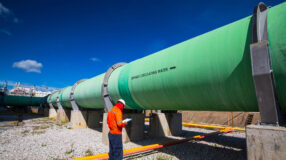Dear Chairman Brady and Ranking Member Neal:
The associations submitting this letter request that our comments be included in the record for the hearing held on March 22 with Commerce Secretary Wilbur Ross. Our specific comments relate to the Section 232 tariffs recently imposed on steel imports, and the impact these new tariffs will have on the entire energy sector, including pipelines.
National security requires pipelines to deliver the energy America needs, and pipelines require specialty steel products not always available in sufficient quantities and specifications from domestic manufacturers. Pipeline projects create construction jobs, bring affordable energy to millions of American consumers, and support American energy production.
For oil and natural gas pipelines, federal safety requirements and industry standards require steel specifications beyond those commonly used in other markets, such as automobiles or building materials. Pipeline-quality steel also is a niche market representing only about three percent of the total U.S. market for steel. Because this type of steel is more expensive and time-consuming to make, domestic producers largely have exited this market, leaving the U.S. with limited productive capacity for this product. In particular, domestic capacity is insufficient to meet the anticipated demand for large-diameter and/or thick-walled pipe that operators use to construct pipelines. For certain steel products, there is zero domestic availability today. To further support our concerns, we would like to submit the ICF study Feasibility and Impacts of Domestic Content Requirements for U.S. Oil and Gas Pipelines that was filed with the Department of Commerce in May 2017. The bottom line is that imports of both pipeline-quality steel, and pipe products, are necessary for timely construction of the new pipeline infrastructure needed to link natural gas and oil producers with industrial, power generation and residential customers.
Pipelines put Americans to work. Already, 75 percent of spending on a pipeline project ends up in the hands of American workers and businesses. A typical 300-mile pipeline project would generate approximately $1 billion in U.S. worker payroll and spending. Tariffs that include pipeline steel will delay or reduce that $1 billion benefit. Pipeline projects are also vital to national security. Because of insufficient pipeline capacity, certain areas of our country continue to rely on imported fuels to meet basic energy needs. As you weigh important concerns about broad steel market issues, we urge caution because American energy jobs depend on specialty pipeline steel products.
We urge policymakers to broaden allowed product exclusions and country exemptions from the new tariffs to increase application efficiency, consider existing anti-dumping and countervailing duties on covered products, and consider pre-existing purchasing and procurement agreements, for steel products needed for energy production, processing, refining, transportation, and distribution. Failing to do so will threaten American energy workers and consumers. We appreciate the Commerce Department’s commitment to review exclusion requests promptly through the process published in the Federal Register earlier this week. We are concerned, however, that failure to allow broader exclusions – and instead require each company to apply for product-specific exclusions – could result in delays and uncertainty.
Sincerely,
|
Andrew J. Black President and CEO Association of Oil Pipe Lines
|
Donald F. Santa President and CEO Interstate Natural Gas Association of America
|
|
Mark Sutton President and CEO GPA Midstream Association
|
Toby Mack President and CEO Energy Equipment and Infrastructure Alliance
|
|
Dena Wiggins President and CEO Natural Gas Supply Association
|
Charlie Riedl Executive Director Center for LNG
|
|
Jack Gerard President and CEO American Petroleum Institute |
Barry Russell President and CEO Independent Petroleum Association of America |





